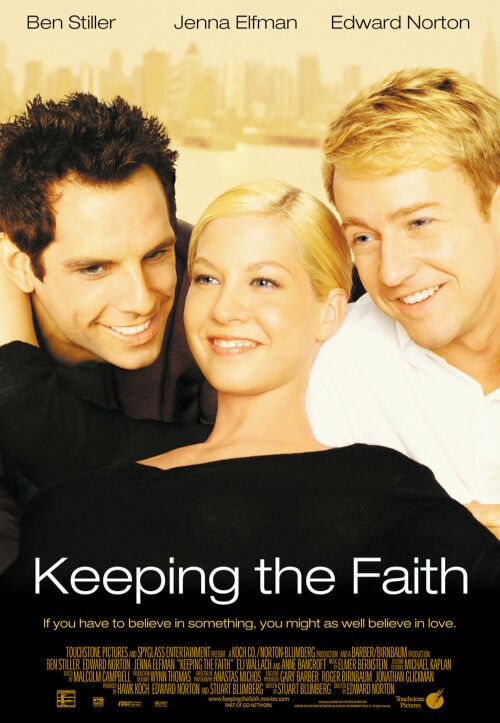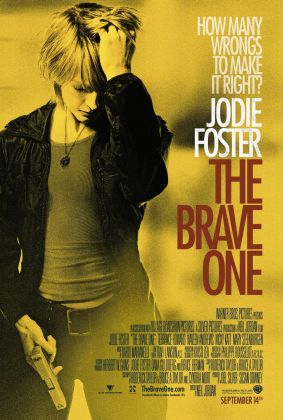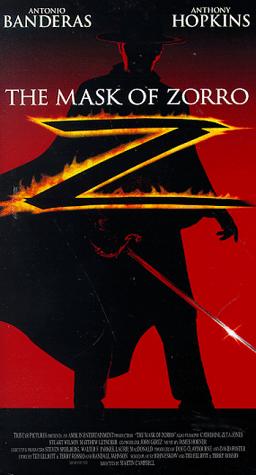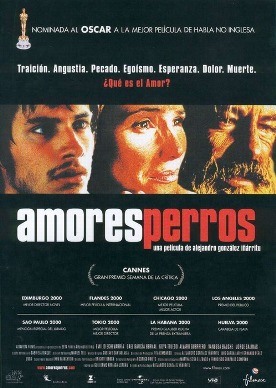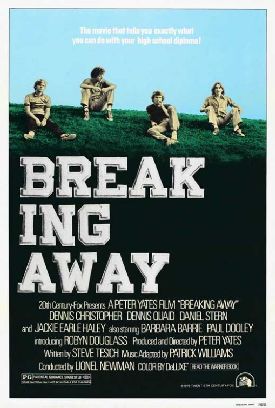Keeping the Faith
Early on in Keeping the Faith, Father Brian Finn (Edward Norton)
advises his worshiping flock, most of whom appear to be worshiping him,
that “faith is different from religion,” and he makes it clear which of the two
he prefers. Religion is old, stuffy, rule-bound, while faith is
personal—“a feeling, a hunch,” he says. I’m not sure that Cardinal
Ratzinger would entirely agree with him about this, but then I don’t suppose
he’d give a Ratzinger’s ass if the Cardinal didn’t. Father Finn’s best pal from
childhood, now a rabbi named Jake Schram (Ben Stiller), is a similarly happening
guy, announcing to his congregation that “Yom Kippur is kind of like the
Superbowl of the Jewish calendar” and apologizing because “lately I haven’t been
sharing my life with you.”
Father Finn and Rabbi Schram are united not only by their childhood
friendship and their mutual crush on the gorgeous Anna Reilly (Jenna Elfman)
whom they have not seen since she moved to California at 13, but also by the
desire to “kick the dust off our faiths.”Of course the dust has been so far
kicked off of both faiths that for years progressive minded simpletons like Finn
and Schram have been kicking the faiths themselves, though I don’t suppose we
should expect Mr Norton, who also directed, to know that. In his mind it is
still the early 1960s, and we are expected to believe that both Catholic and
Jewish congregations are stunned by the casual, hip style of their young
shepherds, the bongo drums and guitars and the kind of ecumenical fervor that
would import the entire Gospel Choir of Harlem to sing in the synagogue in order
to reinvigorate the faith of the old and unenthusiastic.
In real life the dwindling flocks, at least of the Christian denominations,
have been used to little else for 30 years. Neither the film’s one or two good
jokes nor even the presence of the gorgeous Miss Elfman can save it from this
conceptual disaster. Interestingly, Norton and his screenwriter, Stuart
Blumberg, expect to sell us on the attractiveness of Anna not just with her
obvious charms but also by the fact that she is a high-powered businesswoman
from the coast, a Mistress of the Universe apparently, whose brilliant success
in the once-masculine world of deal-making is taken for granted. “I work harder
than God,” she tells the admiring Jake, who is himself more the gentle and
nurturing type: “if he’d had me working for him, he’d have finished the world by
Thursday.” God Himself, as well as his masculine acolytes, is meant to be in awe
of this gal.
As, naturally, are we. Yet you would have to share the film’s blind,
unquestioning faith (a hunch, a feeling, no doubt) in social and moral
“progress” not to feel that she, too, is just the tiniest bit overstated. The
feminist point is as much strained at as the self-conscious hipness and
accessibility of the clergymen. In its old-fashioned, preachy fashion, the film
insists that relations between the sexes, just like those creaky, old-fashioned
religious orthodoxies, must be reinvigorated by an overturning of all the old
assumptions. What a revolutionary idea! It doesn’t realize that the old old
assumptions were overturned years ago. Now it’s the new assumptions that are the
old assumptions—and more than ready to be turned over again, you’d have to
say after seeing this movie.
Discover more from James Bowman
Subscribe to get the latest posts to your email.

